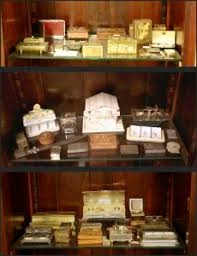Does anyone have a good checklist to leave heirs about collection disposition?
I know this may be a bit touchy, but does anyone know if there is a standardized "checklist" or form that has been created that gives the inheritors of a robust stamp collection direction after the owner's heart stops beating? Something to slip in as an addendum to the will or trust? In SO many cases, such a form would save so much effort and perhaps even heartache/disappointment as I see so many non collectors posting common stamps with the thought they have found the crown jewels. I get the impression that many feel that buyers/dealers are crooks for pointing out the truth. 



Comments
Is that a collection of stamp boxes . . . or is that an assortment of urns with cremated remains (apropos of your post)??
Just some suggestions, by no means all inclusive.
Go over matters briefly with them NOW (prepare)
I would leave prices you paid & current value as of today for each stamp (if you havent done so already) for all items.
(leave photos/scott id for each maybe use an inventory system such as Stamp Manage, or do yourself in an understanfdab;le way)
When you desribe each stamp ie:Us Scott # #230, XF centering, OG original gum, Never H,inged this itself will be a guide for them since they can go online & search for equivalent graded/described stamps & see what others are selling them for on Hip Stamp/EBAY in auctions etc. & get an approximate value.
I would leave instructions, tell them now also NEVER to handle the stamps by taking them out of either stock cards or hingeless album where they are currently housed. since using hands can obviously damage fragile stamps.
Also if they will sell online, they will need to know how to scan, handle & package the stamps to sell & mail to buyers on line.
Print out & tell them now how to house the stamps (room where humidity is conducive to stamps, avoid light, keep album straightup, avoid mold, insect infiltration etc) You can print out such a guide on line.
Inform them of certain legitimate auction houses where you currently feel each stamp would sell for the most at..
Perhaps, try to sell some stamps yourself now.
Before selling, never sell to the first person, ever. Get a price, negotiate higher & get their BEST price. Then go to a second potential buyer & see what they offer, if less mention the price you received (plus 15%) & say that is what you are looking for. If they say yes, DON'T sell, tell them you actually need more time & there are more people I need to go to. Keep doing this until you get the best price. (although riskier thn other ways where YOU KNOW value)
Let them know the current approximate retail value/ wholesale (what it would sell for today through dealers/auctions)
The best advice is the inheritors should become EDUCATED before making any decision if there is huge value in it.
You should sit down 2-3 hours each day & think about it yourself knowing the family members. If they know nothing, describe everything as if to someone that knows nothing, taking nothing for granted.
Get them involved now, it could be fun for all, maybe theyll like it & tell them you are preparing them for the future$$$$, this should be an incentive.
Good luck & hopefully this wont be an issue for many, many happy, healthy long days!
Probate is trying to find out if there is enough in the estate to cover all the final expenses and what may have to be sold to cover those expenses within usually a 12 month time frame from the date the will is placed in probate. After the final expenses are paid then the remainder is split according to the will if a will has been left. Probate is looking to see if there is enough assets to cover all the liabilities. They are looking at if you have to liquidate the assets to cover all the expenses including any final taxes. (And no because I am listed as an heir I did not do the appraisal as it would be a conflict of interest.) The appraiser should be a licensed appraiser.
Once the personal representative is approved by the court, they will have to get an appraisal of the collection. (The
appraisal MUST be valued on what the collection is worth on the day they died.) As far as keeping notes on the value for probate purposes, it's not needed. Probate does not care what you paid for it. They only care on what it's worth at the time of death. (If Grandma paid $500 for that Tiffany vase and it now only goes for $200 they want the value of $200 before the expenses of selling it.)
Probate must be completed first before the heirs ever touch it. Once the personal representative can distribute the assets to the heirs, then the heirs at that point can deal with it at that point.